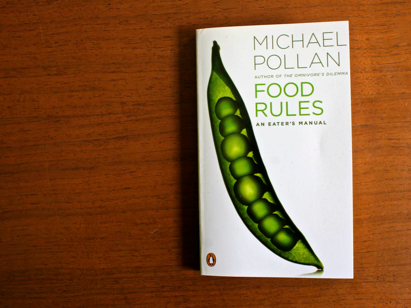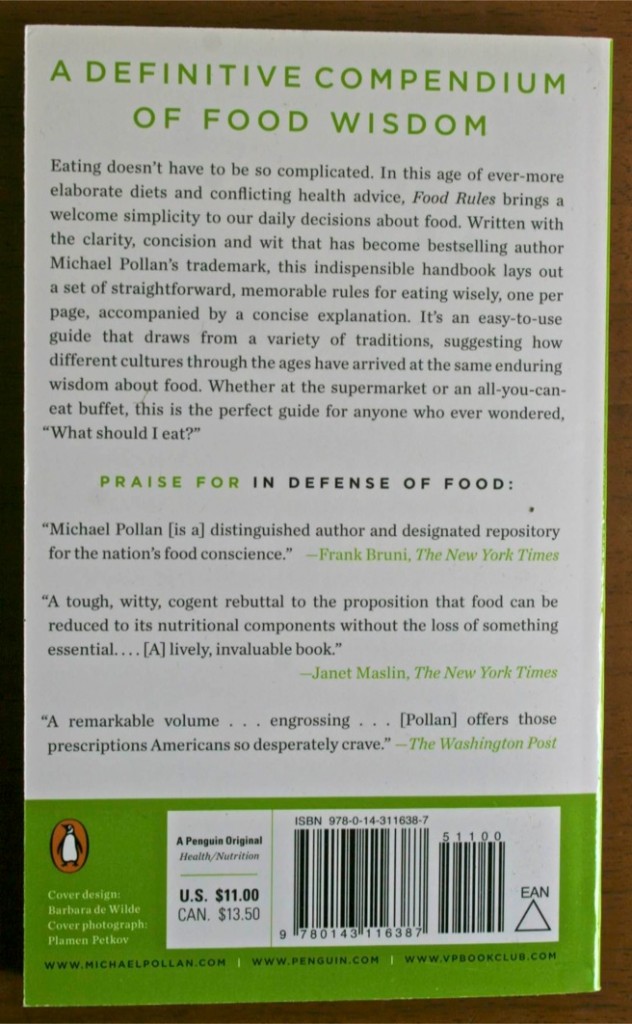
I loved “The Omnivore’s Dilemma” by Michael Pollan. It revolutionized both my thought and my eating/purchasing of food, which is quite something to say. I also liked his subsequent book “In Defense of Food.” I really recommend reading both those books, and this one is especially not a substitute for the first one, but it is a wonderful, concise summary of the practical main points of his final analysis. I purchased this book for a periodic condensed review, since I had read library versions of the other two and do not own them for reference. This book is designed to be just that, an inspirational quick reference of the main points defended in those first two books. As such, I give it five stars. The book includes the following 64 rules, with a one page analysis of each.
1. “Eat food.”
2. “Don’t eat anything your great-grandmother wouldn’t recognize as food.”
3. “Avoid food products containing ingredients that no ordinary human would keep in the pantry.”
4. “Avoid food products that contain high-fructose corn syrup.”
5. “Avoid food that have some form of sugar (or sweetener) listed among the top three ingredients.”
6. “Avoid food products that contain more than five ingredients.”
7. “Avoid food products containing ingredients that a third grader cannot pronounce.”
8. “Avoid food products that make health claims.”
9. “Avoid food products with the wordoid “lite” or the terms “low-fat” or “non-fat” in their names.”
10. “Avoid food that are pretending to be something that they are not.”
11. “Avoid foods that you see advertised on television.”
12. “Shop the peripheries of the supermarket and stay out of the middle.”
13. “Eat only foods that will eventually rot.”
14. “Eat foods made from ingredients that you can picture in their raw state or growing in nature.”
15. “Get out of the supermarket whenever you can.”
16. “Buy your snacks at the farmer’s market.”
17. “Eat only foods that have been cooked by humans.”
18. “Don’t ingest foods made in places where everyone is required to wear a surgical cap.”
19. “If it came from a plant, eat it; if it was made in a plant, don’t.”
20. “It’s not food if it arrived through the window of your car.”
21. “It’s not food if it’s called by the same name in every language (Think Big Mac, Cheetos, or Pringles.)”
22. “Eat mostly plants, especially leaves.”
23. “Treat meat as a flavoring or special occasion food.”
24. “‘Eating what stands on one leg (mushrooms and plant foods) is better than eating what stands on two legs (fowl), which is better than eating what stands on four legs (cows, pigs and other animals.)’”
25. “Eat your colors.”
26. “Drink the spinach water.”
27. “Eat animals that have themselves eaten well.”
28. “If you have the space, buy a freezer.”
29. “Eat like an omnivore.”
30. “Eat well-grown food from healthy soil.”
31. “Eat wild foods when you can.”
32. “Don’t overlook the oily little fishes.”
33. “Eat some foods that have been predigested by bacteria or fungi.”
34. “Sweeten and salt your food yourself.”
35. “Eat sweet foods as you find them in nature.”
36. “Don’t eat breakfast cereals that change the color of the milk.”
37. “‘The whiter the bread the sooner you’ll be dead.’”
38. “Favor the kinds of oils and grains that have been traditionally been stone- ground.”
39. “Eat all the junk food you want as long as you cook it yourself.”
40. “Be the kind of person who takes supplements – then skip the supplements.”
41. Eat more like the French. Or the Japanese. Or the Italians, Or the Greeks.”
42. “Regard nontraditional foods with skepticism.”
43. “Have a glass of wine with dinner.”
44. “Pay more, eat less.”
45. “…Eat less.”
46. “Stop eating before you are full.”
47. “Eat when you are hungry, not when you are bored.”
48. “Consult your gut.”
49. “Eat slowly.”
50. “‘The banquet is in the first bite.’”
51. “Spend as much time enjoying the meal as it took to prepare it.”
52. “Buy smaller plates and glasses.”
53. “Serve a proper portion and don’t go back for seconds.”
54. “‘Breakfast like a king, lunch like a prince, dinner like a pauper.’”
55. “Eat meals.”
56. “Limit your snacks to unprocessed plant foods.”
57. “Don’t get your fuel from the same place your car does.”
58. “Do all your eating at a table.”
59. “Try not to eat alone.”
60. “Treat treats as treats.
61. “Leave something on your plate.”
62. “Plant a vegetable garden if you have space, a window box if you don’t.”
63. “Cook.”
With some notable exceptions (little oily fish and wine), this is what I try to do. I agree with his assessments, and still need to make progress on a few of these guidelines. This book can help keep me focused on doing that.

2 Comments
Pingbacks
-
[…] more of it. I would rather imbibe something more real, and then be satisfied with less. Remember Michael Polan on my blog who summed up his advice to confused omnivores: “Eat food. Mostly plants. Not too […]
-
[…] one of my favorite books, The Omnivore’s Dilemma. I’ve reviewed his books here, and here, and their other cookbook […]


